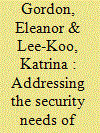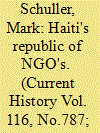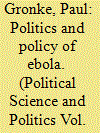|
|
|
Sort Order |
|
|
|
Items / Page
|
|
|
|
|
|
|
| Srl | Item |
| 1 |
ID:
177752


|
|
|
|
|
| Summary/Abstract |
Adolescent girls face significant and often unique forms of insecurity in protracted crises. Yet, their specific needs tend to be overlooked by international agencies, and they are rarely consulted as programs are developed and implemented. Drawing from field research conducted in four crisis contexts—Lake Chad (Niger, Nigeria, and Cameroon), South Sudan and Uganda, Lebanon (Beirut), and Bangladesh (Cox’s Bazar)—this article explores the experiences of insecurity that adolescent girls face in crisis contexts, and the extent to which responses to their needs are inclusive, responsive, and effective. Employing literature from inclusive peacebuilding, the article argues that marginalizing adolescent girls in the development and implementation of programs compromises the ability for such programs to be responsive to their needs. Moreover, it misses the opportunity to employ their skills, knowledge, and strengths to build resilience and security within their communities.
|
|
|
|
|
|
|
|
|
|
|
|
|
|
|
|
| 2 |
ID:
195996


|
|
|
|
|
| Summary/Abstract |
Violent conflict is the key driver in global food crises. In response, researchers, humanitarians and policy stakeholders have sought to better predict, analyse and respond to food crises in conflict-affected contexts. However, efforts to model conflict’s impacts on hunger typically focus on ‘conflict’ as an aggregate category, rarely distinguishing between violence that directly involves food and food systems from wider insecurity. This study proposes a narrower measure of ‘food-related violence (FRV),’ in which food and food systems feature in acts of political violence. The study asks: to what extent is FRV a driver of food crises? To answer, it develops a measure of disaggregated food-related violence from the Armed Conflict Location & Event Dataset, then tests the comparative strength of the relationship between FRV and subsequent food crises in 16 Sub-Saharan African contexts, drawing on food security data from the Integrated Food Phase Classification system and Cadre Harmonisé. The analysis finds that FRV is more strongly correlated to subsequent food crisis than either general – or other subcategories of – violent events across the sample, pointing to the distinct profile of this modality of violence. The findings suggest that researchers, policymakers and practitioners seeking to understand and address the conflict–hunger nexus would benefit from integrating a measure of this specific modality of violence, as existing approaches with a broad focus on conflict-driven food crises may obscure the extent to which FRV, specifically, contributes to hunger.
|
|
|
|
|
|
|
|
|
|
|
|
|
|
|
|
| 3 |
ID:
151237


|
|
|
|
|
| Summary/Abstract |
NGO's and other foreign entities took control of the humanitarian response to the 2010 earthquake, creating parallel structures that contributed to the very duplication and state weaknesses that NGOs were supposed to solve.
|
|
|
|
|
|
|
|
|
|
|
|
|
|
|
|
| 4 |
ID:
140206


|
|
|
|
|
| Summary/Abstract |
It was a dark and stormy night in mid October in Boone, North Carolina. I was late for a gumbo dinner that my co-editor was hosting at his house in honor of a visit to the area by Barbara Walthall, the managing editor for PS. Wind gusts exceeding 50 mph were forecast, and rain was coming down in sheets. I wasn’t quite sure the mountainside wouldn’t wash down on me before I got to Phillip’s house. “Too bad for Barbara,” I thought, “she missed the fall colors by just one day.”
|
|
|
|
|
|
|
|
|
|
|
|
|
|
|
|
|
|
|
|
|